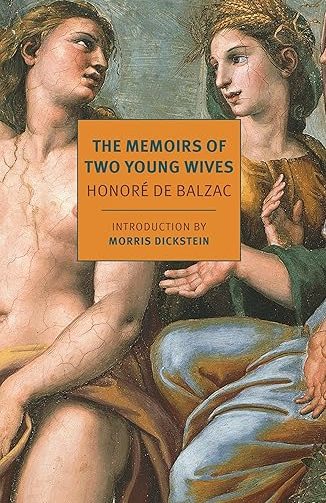I recently finished Honoré de Balzac’s Memories of Two Married Wives, and I have feelings. Big ones. The kind you have after a long dinner with old girlfriends—half-inspired, half-exhausted, and slightly emotionally hungover.
This book is basically the original 19th-Century WhatsApp Group Chat conversation between two best friends—Renée and Louise—who grow up together in a convent, then head off into womanhood down dramatically different paths. Think: “What if you and your bestie made completely opposite life choices, then spent decades dissecting them via eloquent, passionate, sometimes maddeningly long letters?”
Louise? A romantic extremist. She jumps head-first into passionate love, burns bright, and burns out in the most operatic way possible: candles, roses, high drama, and heartbreak. She is the human version of a tragic aria in a red dress.
Renée, on the other hand, chooses a stable, well-planned marriage. She’s the calm one, the grounded one, the voice of practical love. She builds a happy family life and writes with the quiet, reassuring tone of someone who irons her sheets and knows the emotional weather forecast.
Reading their letters is like watching two sides of yourself debate life: one chasing desire and transcendence, the other choosing warmth and reliability. And guess what? Both suffer. Both shine. And both make you want to throw the book across the room at times.
Why I Loved It (Even When I Didn’t)
What Balzac captures here, perhaps unintentionally, is the inner war so many of us live with. The longing for intensity versus the craving for peace. The dream of a love that consumes us, versus the need for a love that anchors us.
There were moments when I rolled my eyes so hard I thought I’d sprain something. Louise’s melodramatic declarations? Chef’s kiss and slight headache. Renée’s moral superiority? Girl, please. But still, these women feel real. Their friendship, their vulnerability, the way they expose their raw hearts on paper—it hit me in places I wasn’t ready to be hit.
Also, the book made me think: how often do we romanticize someone else’s path, while quietly doubting our own? Reading Louise and Renée was like peeking into the parallel universes of “What if I had chosen differently?” It’s unsettling. It’s honest. It’s painfully, beautifully human.
Should You Read It?
If you’ve ever loved deeply and lost your balance, read it.
If you’ve ever doubted your life choices at 2 AM, read it.
If you enjoy 19th-century novels where people write 14-page letters instead of sending a meme with a crying emoji, definitely read it.
But bring patience. And maybe a journal. You might need to write to your own past self after.
Balzac, you sly emotional architect—you got me. I didn’t expect this book to feel so personal, so haunting, so much like a mirror I didn’t ask for. But I’m glad I looked.
Now, excuse me while I go write a letter to my best friend and dramatically seal it with invisible wax.
My favorite quotes from Memories of Two Young Wives:
“Love is such a rare phenomenon that you might live your entire life without ever meeting the one person nature has destined to make you happy. That thought makes you tremble—because if you meet that person too late, what then?“
“Turning your husband into your lover is just as delicate a task as turning your lover into your husband.”
“Marriage is about life, while love is only about pleasure.”
“There are two kinds of love: the one that commands and the one that obeys. Each gives rise to a different passion—and to truly live, a woman might need to know both.”
“How can a man write with such nuance the emotions of a woman?”
“I would rather die of passion than of boredom.”
“We are always making mistakes in our youth that we later justify with philosophy.”

